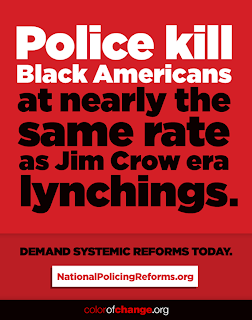That is a shocking claim, isn't it? I decided to try and see if it was true.
The source for the claim seems to be this article in the UK Guardian. Here's the fuller version of the claim:
Not terribly long ago in a country that many people misremember, if they knew it at all, a black person was killed in public every four days for often the most mundane of infractions, or rather accusation of infractions – for taking a hog, making boastful remarks, for stealing 75 cents. For the most banal of missteps, the penalty could be an hours-long spectacle of torture and lynching. No trial, no jury, no judge, no appeal. Now, well into a new century, as a family in Ferguson, Missouri, buries yet another American teenager killed at the hands of authorities, the rate of police killings of black Americans is nearly the same as the rate of lynchings in the early decades of the 20th century.So the "rate" that she's talking about is "once every three or four days."
About twice a week, or every three or four days, an African American has been killed by a white police officer in the seven years ending in 2012, according to studies of the latest data compiled by the Federal Bureau of Investigation. That number is incomplete and likely an undercount, as only a fraction of local police jurisdictions even report such deaths – and those reported are the ones deemed somehow “justifiable”. That means that despite the attention given the deaths of teenagers Trayvon Martin (killed by neighborhood watchman George Zimmerman) and Jordan Davis (killed by a white man for playing his music too loud), their cases would not have been included in that already grim statistic – not only because they were not killed by police but because the state of Florida, for example, is not included in the limited data compiled by the FBI.
However, there's an ambiguity at work. The American black population in 1900 was 8.8 million; today, it is over 38 million. Thus, the "rate" in the statistical sense is only 0.231 the rate of lynchings in 1900 (assuming that 1900 is a good proxy for her claim about when lynchings were once-every-four-days, and that all her numbers are right).
So is the claim true? Yes, and at the same time also no.

